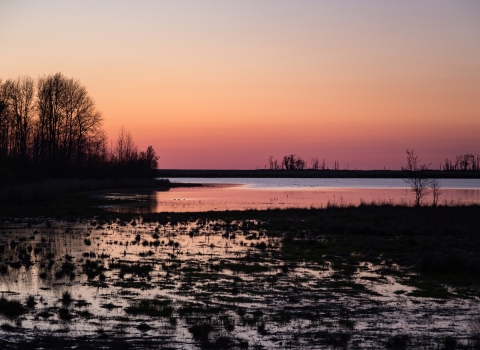State and federal trustee agencies have released a draft plan and environmental assessment to restore natural resources in Buzzards Bay impacted by the Bouchard Barge oil spill. The plan is available for public review and comment through November 18, 2023.
The Trustee Council has scheduled an online public informational meeting via live webinar on November 2 at 6p.m EDT.
Bouchard Barge No. 120 hit a rocky shoal in 2003, spilling oil from a 12-foot gash in the boat’s hull. Federally endangered roseate terns and Massachusetts species of special concern common terns were killed or injured by the oil spill.
Saltmarsh and other shoreline habitats of Ram Island — an important tern nesting area and state wildlife sanctuary in Mattapoisett — were oiled and the resulting cleanup damaged the island’s saltmarsh.
The draft restoration plan and environmental assessment addresses birds injured by the spill as well as habitat restoration.
More than $5 million from the $13.3-million natural resource damage settlement with Bouchard Transportation Co., Inc., in 2017 is designated to plan, implement, oversee, and monitor roseate and common tern restoration. Restoration of shoreline and aquatic resources on Ram Island impacted by the spill will be funded by $534,000 from an earlier settlement. The combined $5.5 million would be used for the overall restoration of these resources.
The draft plan describes the injuries resulting from the 98,000-gallon spill that oiled more than 100 miles of shoreline in Massachusetts and Rhode Island, including coastal habitats where birds feed, nest and, in some cases, overwinter. More than 1,000 birds were killed, including at least nine adult roseate terns and 25 adult common terns.
Ram Island is one of two islands in Massachusetts that serve as critical nesting habitat for half of the North American breeding population of roseate terns. The goal of the Natural Resource Damage Assessment and Restoration program is to replace, restore, rehabilitate, and/or acquire the equivalent of injured natural resources and resource services lost due to the release of oil and/or hazardous substances — at no cost to taxpayers.
The draft plan evaluates multiple restoration projects that were developed by the trustees in coordination with tern experts and other natural resource organizations across the Northeast. Based on factors supporting successful restoration, as well as criteria established by federal regulations, the trustees recommend the following project as the preferred alternative:
- Protect and restore Ram Island’s vulnerable roseate and common tern nesting habitat, reduce ongoing shoreline erosion and scour, and restore saltmarsh habitat through inland, shoreline, intertidal, and offshore approaches at the island:
- Inland: Build higher land elevations on the island and minimize soil loss due to erosion and storm impacts.
- Shoreline: Expand available tern habitat and minimize shoreline loss.
- Intertidal: Enhance and expand saltmarsh habitat, minimize erosion, and reduce wave energies affecting Ram Island, causing shoreline erosion.
- Offshore: Reduce nearshore wave energies.
The draft plan can be found online here. Hardcopies are also available from the U.S. Fish and Wildlife Service at the address listed below. Instructions for attending the virtual information session on November 2 at 6 p.m. EDT can be found at https://www.fws.gov/office/new-england-ecological-services.
Written comments are due by November 18 and should be submitted to Dr. Latice Fuentes with the U.S. Fish and Wildlife Service at latice_fuentes@fws.gov or by mail to U.S. Fish and Wildlife Service, 70 Commercial Street Suite 300, Concord, NH 03301 Attn: Dr. Latice Fuentes.
The Natural Resource Trustee Council for the B-120 Buzzards Bay Oil Spill includes representatives from the Massachusetts Department of Environmental Protection, representing the Massachusetts Executive Office of Energy and Environmental Affairs; the Rhode Island Department of Environmental Management; United States Fish and Wildlife Service, representing the U.S. Department of the Interior; and the National Oceanic and Atmospheric Administration, representing the U.S. Department of Commerce. Impacts to tribal resources were addressed by the Wampanoag Tribe of Gay Head through a separate settlement with Bouchard.
The Administrative Record and previously released restoration planning documents for the case can be found at https://www.diver.orr.noaa.gov/web/guest/diver-admin-record.
Contact:
Keith Shannon, USFWS
Lindsay Rosegger, NOAA (301) 427-8718
Ed Coletta, MassDEP (617) 797-2683
Nicole McSweeney, MassWildlife (508) 389-6327
Michael Healey, RIDEM (401) 222-2771



